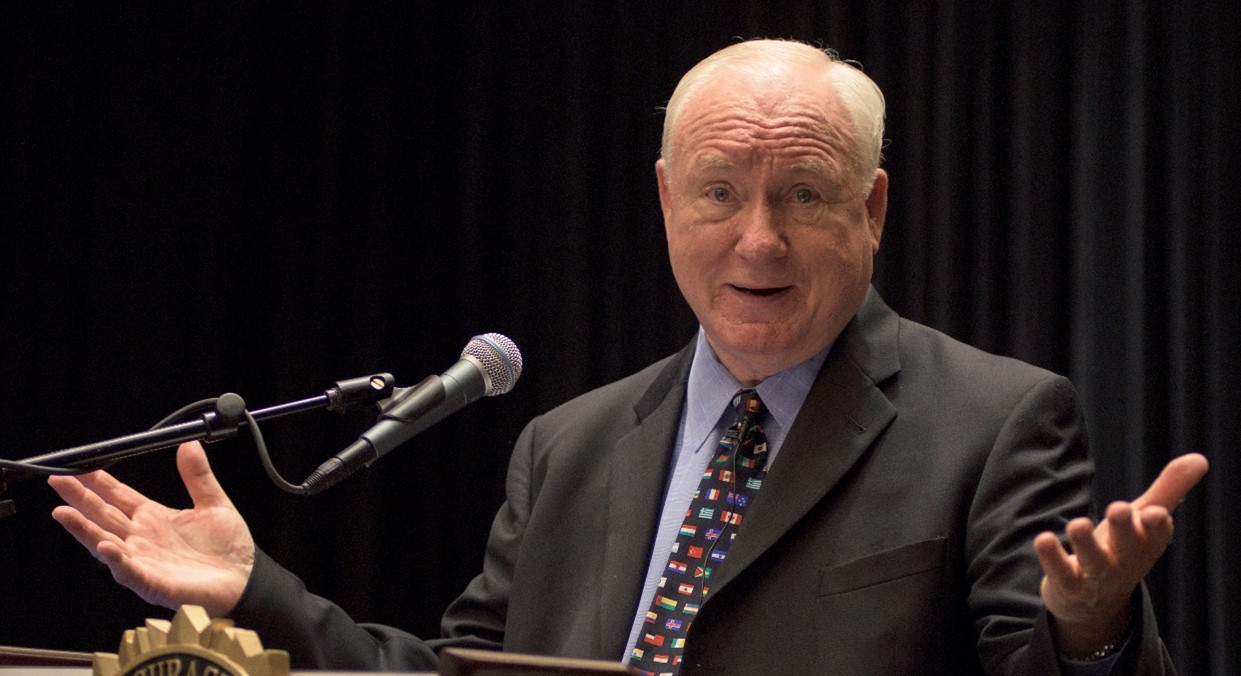Action #1 Required This Day
Your Personal Daily Ethics Audit
By James E. Lukaszewski,
ABC, Fellow IABC, APR, Fellow PRSA, BEPS Emeritus
Resolve today to get in the habit of regularly assessing your personal daily ethics exposure. It’s likely that your exposures will be a surprise. This paper presents a simple series of response options. In my crisis work the appearance of ethical questions was pretty frequent and I found that I needed a way to quickly assess these situations and determine what, if any, action might be needed.
We start with the first signs…the queasy stomach that tells you something is out of order or going there, perhaps soon. Then the remaining steps in the process are designed to help you move into a response mode if necessary, even a deeply responsive mode if extremely necessary.
Click on Moral Questions link to review a blog post for deeper penetration of more serious situations.
Step One:
Respond to First Signs or Concerns
The moment your stomach gets that twinge about what you are doing or planning to do, or someone else in your company is starting or plans to start doing, stop and ask yourself:
-
- What is the ideal ethical behavior here?
- How are ethical questions being surfaced and addressed?
- What is remaining unsaid, ignored, actually covered up?
- When will leaders address the ethical expectations of others?
- Is the profit or personal gain motive in balance with The PRSA Code of Ethics and your own ethical expectations?
- First mentioned to me eons ago by Emmanuel Tchividjian former PRSA BEPS member, Principal – The Markus Gabriel Group – US Phone Number: 646-209-0711, Norwegian Phone Number: 983-555-63, Email: emmanueltchividjian@gmail.com, Website: www.markusgabrielgroup.com.
Step Two:
Ethical Decision-Making Guide to
Help Resolve Ethical Dilemmas
By Kathy R. Fitzpatrick, JD, APR, Former Member BEPS
On PRSA.org
*Kathy R. Fitzpatrick, J.D., APR – Former Member of BEPS Director and Professor, The Zimmerman School at University of South Florida Email: fitzpatrick10@usf.edu Website: usf.edu/zimmermanschool
For public relations and other professionals, ethical dilemmas arise when responsibilities and loyalties conflict and a decision about the appropriate – i.e., ethical – course of action must be made. Often, a choice is required among actions that meet competing obligations. For example, when might the obligation to serve the public interest override loyalty to clients? When does a particular stakeholder’s interest take priority over an employer’s interest? In other words, just exactly what is “responsible advocacy”? Apply these questions to sort things out:
-
- Define the specific ethical malpractice issue/conflict.
- Identify internal/external factors (e.g., legal, political, social, economic) that may influence the decision.
- Identify key values.
- Identify the parties who will be affected by the decision and define the public relations professional’s obligation to each.
- Select ethical principles to guide the decision-making process.
- Make a decision and justify it.
-
Step Three:
Use The Lexicon Of Unethical
Public Relations Behavior
Every Code provision in the PRSA Code of Ethics, as well as every Professional Standards Advisory (PSA) contains examples of improper conduct. As subsequent Professional Standards Advisories are developed by the PRSA Board of Ethics and Professional Standards (BEPS), approved and deployed, additional terms to describe improper conduct will be further explained, and examples provided.
The current PRSA Code lexicon of improper conduct includes:
-
- Unethical conduct – Clear conduct that goes against the Code.
-
- Improper conduct – Conduct that should be questioned.
-
- Malpractice – Obviously, poor or flawed judgment and behavior.
-
- Inappropriate behavior – Feels wrong, needs to be stopped.
-
- Inconsistent with the Code
-
- Disruptive to or can undermine ethical practice – Behavior that should stop, may require remedial action.
-
- Destructive to the reputation of practitioners, our profession, or our Society – You’ll know it when you see it, stand up, speak out, and stop it.
a. Voluntary Societies Have,
Established Inspirational Codes Of Conduct.
Journalism, public relations, advertising, Word of Mouth (WOM), The Global Alliance, and many other voluntary professional or trade associations, failing to have a legal basis for using enforceable regulatory oversight, have focused on inspiration and education of their members. Lawyers, doctors, accountants, police officers, dentists, hairdressers, barbers, and other services that are licensed by a state, county or government authority, can and do impose penalties and sanction violations. The PRSA Code is an aspirational document designed to facilitate, educate, and inspire ethical behavior and also to call out malpractice and unethical conduct.
b. Using the PRSA Code of Conduct (From PRSA.org)
With Examples of Improper Conduct
Conduct #1 – Free Flow of Information
Core Principle:
Protecting and advancing the free flow of accurate and truthful information is essential to serving the public interest and contributing to informed decision-making in a democratic society.Intent:
- To maintain the integrity of relationships with the media, government officials, and the public.
- To aid informed decision-making.
Guidelines:
A member shall:
- Preserve the integrity of the process of communication.
- Be honest and accurate in all communications.
- Act promptly to correct erroneous communications for which the practitioner is responsible.
- Preserve the free flow of unprejudiced information when giving or receiving gifts by ensuring that gifts are nominal, legal, and infrequent.
Examples of Improper Conduct Under this Provision:
- A member representing a ski manufacturer gives a pair of expensive racing skis to a sports magazine columnist, to influence the columnist to write favorable articles about the product.
- A member entertains a government official beyond legal limits and/or in violation of government reporting requirements.
Conduct #2 – Competition
Core Principle:
Promoting healthy and fair competition among professionals preserves an ethical climate while fostering a robust business environment.Intent:
- To promote respect and fair competition among public relations professionals.
- To serve the public interest by providing the widest choice of practitioner options.
Guidelines:
A member shall:
- Follow ethical hiring practices designed to respect free and open competition without deliberately undermining a competitor.
- Preserve intellectual property rights in the marketplace.
Examples of Improper Conduct Under This Provision:
- A member employed by a “client organization” shares helpful information with a counseling firm that is competing with others for the organization’s business.
- A member spreads malicious and unfounded rumors about a competitor in order to alienate the competitor’s clients and employees in a ploy to recruit people and business.
Conduct #3 – Disclosure of Information
Core Principle:
Open communication fosters informed decision-making in a democratic society.Intent:
To build trust with the public by revealing all information needed for responsible decision-making.Guidelines:
A member shall:
- Be honest and accurate in all communications.
- Act promptly to correct erroneous communications for which the member is responsible.
- Investigate the truthfulness and accuracy of information released on behalf of those represented.
- Reveal the sponsors for causes and interests represented.
- Disclose financial interest (such as stock ownership) in a client’s organization.
- Avoid deceptive practices.
Examples of Improper Conduct Under this Provision:
- Front groups: A member implements “grassroots” campaigns or letter-writing campaigns to legislators on behalf of undisclosed interest groups.
- Lying by omission: A practitioner for a corporation knowingly fails to release financial information, giving a misleading impression of the corporation’s performance.
- A member discovers inaccurate information disseminated via a website or media kit and does not correct the information.
- A member deceives the public by employing people to pose as volunteers to speak at public hearings and participate in “grassroots” campaigns.
Conduct #4 – Safeguarding Confidences
Core Principle:
Client trust requires appropriate protection of confidential and private information.Intent:
To protect the privacy rights of clients, organizations, and individuals by safeguarding confidential information.Guidelines:
- A member shall: Safeguard the confidences and privacy rights of present, former, and prospective clients and employees.
- Protect privileged, confidential, or insider information gained from a client or organization.
- Immediately advise an appropriate authority if a member discovers that confidential information is being divulged by an employee of a client company or organization.
Examples of Improper Conduct Under This Provision:
- A member changes jobs, takes confidential information, and uses that information in the new position to the detriment of the former employer.
- A member intentionally leaks proprietary information to the detriment of some other party.
Conduct #5 – Conflicts of Interest
Core Principle:
Avoiding real, potential or perceived conflicts of interest builds the trust of clients, employers, and the publics.Intent:
- To earn trust and mutual respect with clients or employers.
- To build trust with the public by avoiding or ending situations that put one’s personal or professional interests in conflict with society’s interests.
Guidelines:
A member shall:
- Act in the best interests of the client or employer, even subordinating the member’s personal interests.
- Avoid actions and circumstances that may appear to compromise good business judgment or create a conflict between personal and professional interests.
- Disclose promptly any existing or potential conflict of interest to affected clients or organizations.
- Encourage clients and customers to determine if a conflict exists after notifying all affected parties.
Examples of Improper Conduct Under This Provision:
- The member fails to disclose that he or she has a strong financial interest in a client’s chief competitor.
- The member represents a “competitor company” or a “conflicting interest” without informing a prospective client.
Conduct #6 – Enhancing the Profession
Core Principle:
Public relations professionals work constantly to strengthen the public’s trust in the profession.Intent:
- To build respect and credibility with the public for the profession of public relations.
- To improve, adapt and expand professional practices.
Guidelines:
A member shall:
- Acknowledge that there is an obligation to protect and enhance the profession.
- Keep informed and educated about practices in the profession to ensure ethical conduct.
- Actively pursue Personal Professional Development.
- Decline representation of clients or organizations that urge or require actions contrary to this Code.
- Accurately define what public relations activities can accomplish.
- Counsel subordinates in proper ethical decision-making.
- Require that subordinates adhere to the ethical requirements of the Code.
- Report practices that fail to comply with the Code, whether committed by PRSA members or not, to the appropriate authority.
Examples of Improper Conduct Under This Provision:
- A PRSA member declares publicly that a product the client sells is safe, without disclosing evidence to the contrary.
- A member initially assigns some questionable client work to a non-member practitioner to avoid the ethical obligation of PRSA membership.
A Days End Assessment
When those days come along where your stomach is queasy at the very beginning, you know you’re going to have a long day and you will want to have a sensible process for wrapping things up at the end of the day. Just take a few moments to review what happened during the day from an ethical point of view on the things you need to be concerned about and take action on. Create a simple to-do list to get these things done before they fall through a crack.
If you have any questions at all, contact your Chapter Ethics Officer who is ready and waiting to be of assistance. Good luck and remember, working through these ethical issues and questions is one of the most important things we can do as practitioners.
I, too, am available 24/7 to answer questions and to be of service in these important matters at any time. Besides, I’ve committed my life to working these areas of importance and really do love talking about them and helping others have better days. jel@e911.com
James E. Lukaszewski, ABC, Fellow IABC, APR, Fellow PRSA, BEPS Emeritus, is the longest-serving member of BEPS, 35 years. In 2015, the PRSA Board of Directors conferred Emeritus status. So far, Jim is the only Emeritus BEPS board member. He publishes a wide variety of commentaries, lexicons, manifestos, and analyses of ethics practices and malpractices in public relations, business, and society every year.


